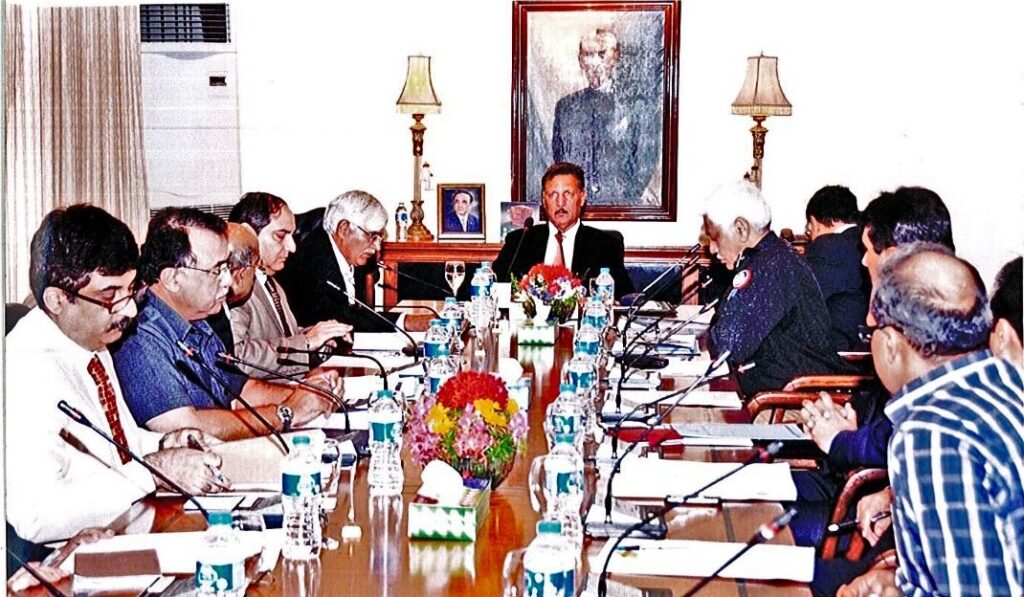In an exclusive interview with Times Featured, Malik Habib Khan, Former Federal Interior Minister of Pakistan, emphasized the imperative need for robust cybersecurity measures to protect the country’s national cyberspace. Khan’s remarks come at a time when the world is increasingly vulnerable to cyber threats, and Pakistan is no exception.
The importance of safeguarding national cyberspace cannot be overstated. Cyberspace has become an integral part of modern life, with individuals, businesses, and governments relying heavily on digital platforms for communication, commerce, and governance. However, this increased dependence on technology and foreign applications and operating systems without any checks and balances has also created new vulnerabilities, which, if exploited, can have devastating consequences for national security.
“A pivotal concern highlighted by Malik Habib revolves around the surreptitious exploitation of illegal and anti-Pakistan spectrum operations, wherein a plethora of mobile and online applications are hijacked or designed to be used for insidious purposes, thereby undermining the country’s economic viability, propagating moral decadence, cultivating demotivation, and disseminating a toxic cocktail of misinformation, disinformation, and fabricated news with clandestine motivations. This pernicious phenomenon not only compromises the inviolability of the nation’s communication networks but also erodes the foundational pillars of societal cohesion, thereby jeopardizing the country’s socio-economic equilibrium and national security.
” Habib Malik further expressed his concerns on 5th Generation Hybrid War in the cyberspace domain as an invisible proxy war, which has surpassed traditional proxy wars practiced globally over the past few decades, the consequences of failing to safeguard national cyberspace are dire, especially in the 4th Industrial Revolution era. Cyber-attacks can compromise sensitive information, disrupt critical infrastructure, and even undermine a country’s economic stability which no other weapon of mass destruction can do in such a silent way. Furthermore, the reputational damage caused by a major cyber breach and misuse can have long-lasting consequences, deterring foreign investment, national economy and eroding public trust.”
The following key recommendations were proposed by Malik Habib Khan during the discussion:
- The paramount focus is on conceptualizing a multifaceted framework for the introduction of a Digital ID system, obliging users to authenticate their identity as a precursor to accessing internet services, thereby forestalling unauthorized access by suspicious entities within the country, as a minimum. Furthermore, Pakistan may plan to advocate for the adoption of this proposition and proposal at the United Nations and the International Telecommunication Union, with the overarching objective of countering the dissemination of misinformation and disinformation, while also preventing the nefarious utilization of Artificial Intelligence and deep fake technologies.”
- Establish an autonomous National Cybersecurity Agency (CSA) as an independent entity to coordinate and respond to cyber threats and challenges, ensuring a unified and effective response.
- Develop and implement more robust and holistic cyber laws to protect cyberspace and establish cybersecurity governance.
- Implement cutting-edge cybersecurity measures, including artificial intelligence-powered threat detection and response systems.
- Foster public-private International partnerships to leverage resources, expertise, and knowledge, enhancing the nation’s cybersecurity posture.
- Invest in cybersecurity research and development, ensuring the nation stays abreast of evolving cyber threats and technologies.
Through the efficacious implementation of these strategic measures, Pakistan can effectively fortify its national cyberspace, thereby ensuring the comprehensive protection of its citizens, businesses, and government institutions from the ubiquitous and insidious threat of cyber-attacks, which pose a perpetual risk to the integrity and confidentiality of sensitive information, critical infrastructure, and economic stability.


